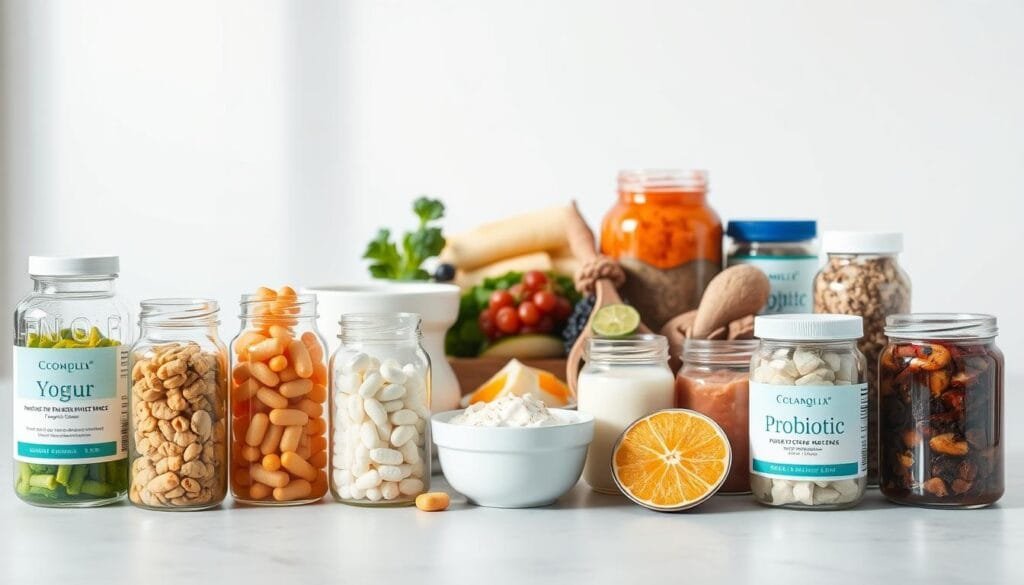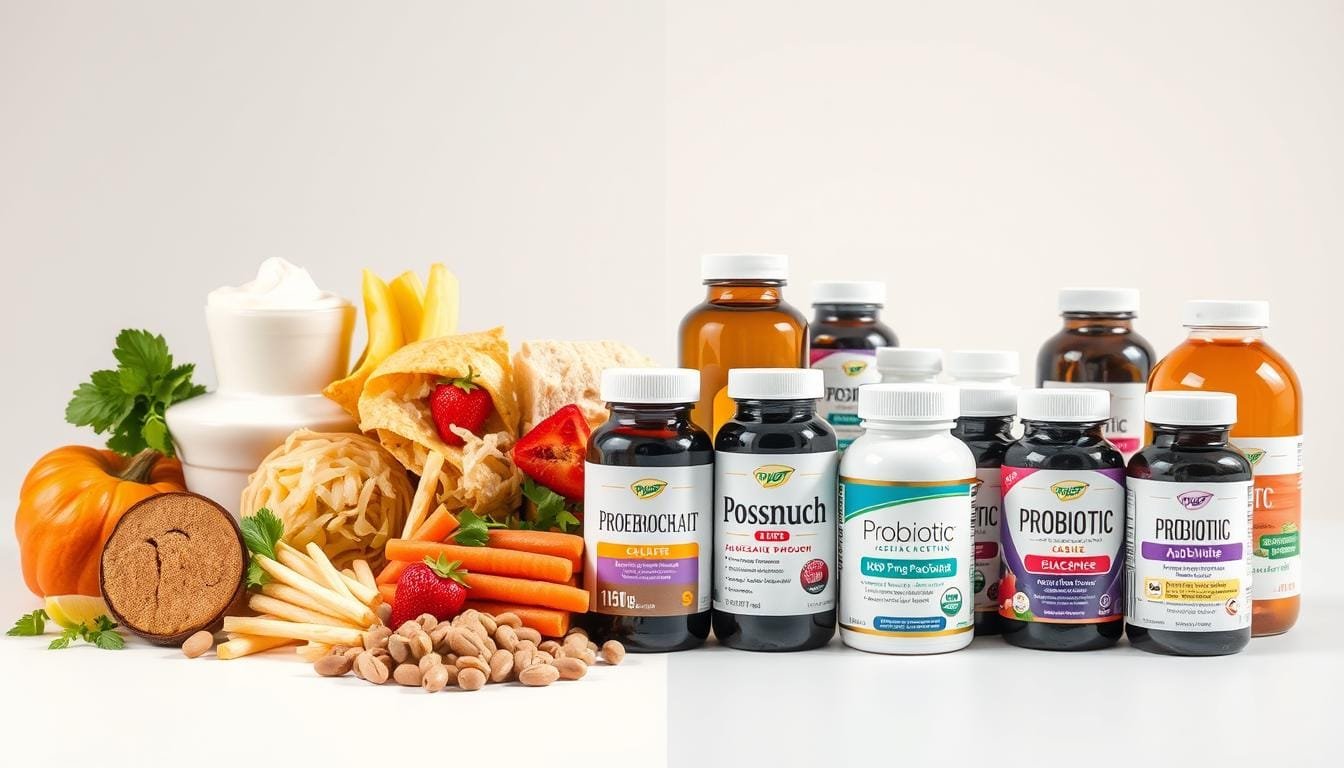Currently Empty: RM0.00
Surprising fact: nearly one in three people report adding live cultures to their routine to ease digestion and boost immunity.
Probiotics are defined as live microorganisms that can support a balanced gut and help digestion. They also play a role in immune response and regularity, which ties into overall health.
This piece offers a fair, evidence-informed look at getting beneficial bacteria from meals or targeted products. It explains how fermented choices like yogurt, kimchi, or kefir work only when they contain live and active cultures at consumption.
Supplements can deliver specific strains and measured amounts. In contrast, culinary sources bring extra nutrients and prebiotics that feed a healthy microbiome.
Readers in Malaysia should note that regulation differs between categories, affecting labels and verification. Wellness Concept offers friendly guidance — contact WhatsApp +60123822655 during business hours for local help.
Key Takeaways
- Live microorganisms can support digestion, immunity, and gut health.
- Both dietary choices and targeted products offer real health benefits when chosen wisely.
- Fermented items must have live cultures at the time of eating to count.
- Products deliver measured strains; meals provide nutrients and prebiotics.
- Regulation in Malaysia affects labeling and quality checks.
- Wellness Concept on WhatsApp can help tailor choices to daily habits and goals.
Understanding Probiotics Today: What They Are and Why They Matter
Living cultures act quietly in the gut to support digestion and immune resilience.
Definition and role. Probiotics are helpful living bacteria and yeasts that, in adequate amounts, help the body keep microbial balance and support the immune system.
Why the gut matters. The gut houses vast communities of microorganisms. Greater variety and abundance often link to better digestion, regularity, and overall health.
Common families and what they do
Researchers often study Lactobacillus and Bifidobacterium strains. Examples include L. acidophilus and B. longum. Different strains can have distinct effects, so strain identity matters for outcomes.
Viability is key. Only viable organisms that survive processing and the digestive tract can deliver benefits. Dead microbes do not work the same way.
“Effectiveness varies by strain; evidence supports better regularity and digestive comfort, with ongoing research into broader outcomes.”
- Sources include fermented foods and targeted products that list live cultures.
- Labels should state living cultures and CFU at end of shelf life.
- Think of these microbes as part of a lifestyle—diet, sleep, and stress all shape the gut.
For tailored advice in Malaysia, message Wellness Concept on WhatsApp at +60123822655 (Mon–Fri 9:30–18:30, Sat 10:00–17:00).
Probiotic supplements vs food: the core differences that affect results
The main differences that change outcomes are which strains are present, how many survive, and what else comes with them.

Targeted strains and CFU potency
Targeted formulas often list specific strain names and higher CFU counts (many products offer 1–10 billion CFU or more). That makes it easier to match a product to a goal.
By contrast, common fermented items like yogurt may carry one or two strains and lower counts. Foods give variety, but not always the dose seen in some products.
Survival and viability
Labels should state CFU at the end of shelf life. Viability falls during storage, so the number at manufacture can be misleading.
Survival through the digestive tract depends on strain, formulation, and delivery. Some dietary technologies aim to protect bacteria so more reach the gut alive.
Nutrient package and practical cues
Fermented choices bring fiber, prebiotics, and micronutrients that support bacterial communities alongside live cultures.
Look for “live/active cultures” on packaging, choose unpasteurized sauerkraut, and avoid vinegar-only pickles if probiotic effects are the goal.
Regulation in Malaysia
In Malaysia, products that claim live cultures fall under two systems. Foods follow the Food Act 1983 and Food Regulation 1985.
Targeted formulas are regulated by NPRA; legitimate items show a MAL registration number and Meditag hologram. Wellness Concept can help Malaysians check labels — discover what is most important in a probiotic for gut — WhatsApp +60123822655 (Mon–Fri 9:30 am–6:30 pm; Sat 10:00 am–5:00 pm).
“Both routes can support gut health; choice depends on dose, strain, and consistent use.”
When supplements shine and when foods win for gut health
Some situations call for a measured, strain-focused approach while others benefit from simple dietary variety.
If addressing specific issues: strain-specific choices with a healthcare provider
Targeted products help after antibiotics or for clear dysbiosis symptoms because they can supply named strains such as L. rhamnosus or B. longum.
A qualified provider or healthcare provider can match a probiotic supplement to a goal and check for interactions or tolerance. Wellness Concept encourages consulting a practitioner before starting new items. WhatsApp +60123822655 (Mon–Fri 9:30 am–6:30 pm; Sat 10 am–5 pm).
Daily diversity from diet: yogurt, kefir, kimchi, sauerkraut, and kombucha
Everyday fermented foods add variety, vitamins, minerals, and fiber that support a healthy gut and the immune system.
People gain consistent benefits by rotating choices and keeping portions small and regular.
“Combining selected strains with varied fermented choices helps maintain microbial diversity and steady comfort.”
| Scenario | Best fit | Why |
|---|---|---|
| Post-antibiotic recovery | Targeted probiotic supplements | Specific strains and dose aid recolonization |
| Everyday maintenance | Fermented foods | Dietary variety supplies micronutrients and prebiotics |
| Diet restrictions | Carefully chosen products or low-lactose options | Matches taste, budget, and tolerance |
Small, steady steps matter. Try yogurt or kefir at breakfast, add kimchi or sauerkraut at lunch, and rotate through the week. Track how the gut responds for a few weeks and adjust with a provider if needed.
How to choose quality probiotics and fermented foods in Malaysia
Choosing trustworthy live-culture options starts with a quick label check and simple store habits.

Reading labels and verifying legitimacy
Look for “live/active cultures” and CFU listed at the end of shelf life. Check strain names and storage instructions to judge viable delivery.
In Malaysia, verify NPRA oversight: genuine supplements display a MAL number and Meditag hologram. Foods fall under the Food Act 1983 and Food Regulation 1985.
Smarter picks at the store
Prioritize unpasteurized sauerkraut and truly fermented pickles rather than vinegar-only jars. Compare yogurt choices by listed cultures and sugar content for better nutrient balance.
Supplement savvy and practical formats
When a measured dose is needed, choose multi-strain blends that list CFU at expiry. Seek dairy- or soy-free, sugar-free options and convenient formats like capsules, liquids, or powders.
Match choices to goals with a provider
Consistent use and the right strains matter for lasting effects. They should chat with a healthcare provider to align strains and any medications or conditions.
“For hands-on help checking MAL numbers, Meditag holograms, or comparing store options in Malaysia, contact Wellness Concept on WhatsApp at +60123822655 (Mon–Fri 9:30 am–6:30 pm; Sat 10 am–5 pm).”
- Favor items that combine live cultures with prebiotics and other nutrients.
- Keep cold-chain items chilled and note expiry time to protect bacteria viability.
- Mix budget-friendly fermented foods with a well-chosen supplement when practical.
Lifestyle fit: choosing food, supplements, or both for overall health
A practical match between lifestyle and delivery method often decides the best route to support gut health.
Both fermented foods and measured products can deliver real benefits, yet head-to-head clinical trials are limited. The right choice depends on daily routine, budget, and taste.
Aim for consistency. Choose options you enjoy and can repeat most days. Small, steady habits beat occasional overhauls for overall health.
- Rotate fermented foods—yogurt, kefir, kimchi—to add nutrients and variety.
- Weave in prebiotics from plants to feed microbes and boost benefits.
- If time is tight, pair ready-to-eat fermented foods with a once-daily product to cover gaps.
- Track digestion and energy for a few weeks and adjust with a healthcare provider as needed.
Simple weekly template: aim for a morning fermented option three days, a fermented side at two meals, and a consistent daily product on busier days.
“Follow evolving research, but prioritize practical habits that fit your life.”
For a friendly, local check-in to tailor a plan, contact Wellness Concept on WhatsApp +60123822655. Hours: Mon–Fri 9:30 am–6:30 pm; Sat 10 am–5 pm; Sun Closed.
Conclusion
Clear choices paired with steady habits help most people support a healthy gut.
Evidence shows that probiotics from both cultured meals and targeted products can aid digestion and immune resilience when viable strains survive the process and storage. Viable microorganisms and clear strain labels matter most, and bacteria survival varies by product and handling.
Mix approaches: include fermented options like yogurt, kefir, or kimchi with a well-matched product when needed. Add prebiotics from plants to feed microbes and choose simple formats (capsules, liquids, or powders) if days are busy.
Research is ongoing and personal response varies. For friendly, local advice in Malaysia, message Wellness Concept on WhatsApp at +60123822655 (Mon–Fri 9:30 am–6:30 pm; Sat 10 am–5 pm).
FAQ
What are live microorganisms and why do they matter for gut and immune health?
Live microorganisms are beneficial bacteria and yeasts that help balance the gut ecosystem. They support digestion, nutrient absorption, and immune responses. People see benefits when products contain strains that survive stomach acid and reach the intestines alive.
Which genera and strains are most common and well-researched?
Lactobacillus and Bifidobacterium species are among the most studied. Specific strains within these genera have evidence for easing diarrhea, supporting bowel regularity, and reducing some antibiotic-associated side effects. Strain identity matters for targeted effects.
How do targeted strains and CFU potency differ between pills and fermented items?
Pills often list specific strains and a high colony-forming unit (CFU) count, designed for predictable dosing. Fermented items usually contain a wider variety of bacteria but fewer documented CFU guarantees and less strain specificity.
Do live cultures survive processing, storage, and stomach acid?
Survival depends on product formulation, packaging, and storage. Some capsules use acid-resistant delivery or refrigeration to maintain viability. Unpasteurized, properly stored fermented foods can also deliver live microbes, but heat-treated or pasteurized products may not.
What extra nutrients do fermented products provide compared to pills?
Fermented foods deliver more than microbes: they often include fiber, short-chain fatty acids, vitamins, and prebiotic compounds that feed beneficial microbes. This nutrient package can support broader gut and metabolic health.
How are these products regulated in Malaysia?
In Malaysia, medicinal products must be registered with NPRA and carry a MAL number, while fermented foods fall under Food Act standards. Consumers should look for clear labeling and, for medicinal claims, official registration details.
When should someone choose a targeted formulation over dietary sources?
Targeted formulations are useful when addressing a specific condition—such as recurrent antibiotic-associated diarrhea, IBS symptoms, or immune support—especially when a healthcare provider recommends particular strains and doses.
How can daily dietary diversity help gut health?
Regularly eating yogurt, kefir, kimchi, sauerkraut, and kombucha exposes the gut to diverse microbes and supporting nutrients. Variety helps maintain a resilient microbiome and complements targeted interventions when needed.
What should shoppers look for on labels in Malaysia?
Look for “live” or “active” culture claims, strain-level identification, CFU at end of shelf life, storage instructions, and any NPRA registration for medicinal claims. Check expiration dates and refrigeration requirements.
Which fermented products are smarter picks at the store?
Unpasteurized sauerkraut and truly fermented pickles typically contain live communities. For kombucha and kefir, choose brands that state live cultures and avoid excessive added sugar. Read ingredient lists for authenticity.
What qualities matter in a quality targeted product?
Choose multi-strain blends with documented evidence for the intended use, allergen-free and low-sugar formulations, clear storage guidance, and transparent manufacturing practices. Third-party testing adds confidence.
Should someone consult a healthcare provider before taking a product?
Yes. A provider can match strains and dosages to individual goals, consider interactions with medications, and advise immunocompromised people who may need caution with live microbes.
Can people combine dietary sources and targeted products safely?
Many people benefit from combining both: fermented foods for daily diversity and nutrients, plus a targeted product when addressing specific issues. Timing, storage, and product quality help ensure complementary effects.
How long does it take to notice changes in gut health after starting a product?
Some effects, like softer stools or reduced bloating, can appear within days. More sustained changes to microbiome composition and immune benefits may take weeks to months, depending on diet, lifestyle, and the product used.



